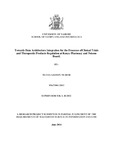| dc.description.abstract | While therapeutic products have been with us for millennia, the question of how the quality,
safety and efficacy of these products can be achieved and monitored effectively still eludes us.
Many methods have been employed over time with varying degrees of success.
In the modern world the process of ensuring safety, quality and efficacy starts at drug
development (molecule), testing (clinical trials), and registration by a competent authority
(regulatory body) and finally post registration marketing surveillance. To do this data is
gathered throughout the regulatory steps and used to determine the fitness of the product in
its intended purpose. This is a process carried out by the regulator authority.
In Kenya the regulatory authority is Pharmacy and Poisons Board (Board). The Board
regulates clinical trials and registration of therapeutic products in line with international
standards. This is a process flaunted with challenges taking into account the law does not
explicitly require the Board to regulate clinical trials and most clinical trials are done outside
Kenya.
This report proposes how the Pharmacy and Poisons Board can utilize information
technology to overcome regulatory challenges and achieve international standards, by
integrating data from Clinical Trials Registry and Electronic Common Technical Document
repositories. Using a mathematical formula proposed in this report, the Board can integrate
data from clinical trials repository into the therapeutic products repository as specific data set
areas that can be used to inform the product registration process as required by law. By using
the formula to integrate the two repositories, the Board will meet international standards,
overcome its regulatory challenges and still be in position to absorb any changes in
international standards or local laws without having to change or re-engineer its systems. Desk reviews of Pharmacy and Poisons Board guidelines, policies, existing laws and
international standards were done together none structured interviews conducted in the East
Africa National Medicines Registration Authorities. The results from the research show
processes that are in need of re-engineering and laws and policies that need to be changed to
allow for clinical trials to be made mandatory during therapeutic product evaluation.
The report concludes that there is need to depart from traditions in therapeutic products
management and change the clinical trials and therapeutic products evaluation processes,
tools and standards to reflect a modern appreciation of the existence of information
management technologies in data management. | en_US |

